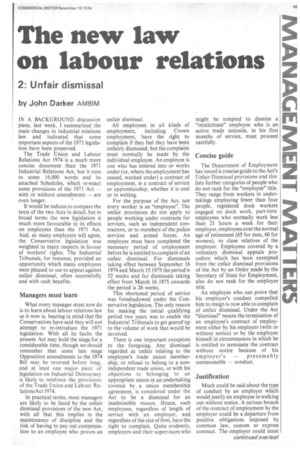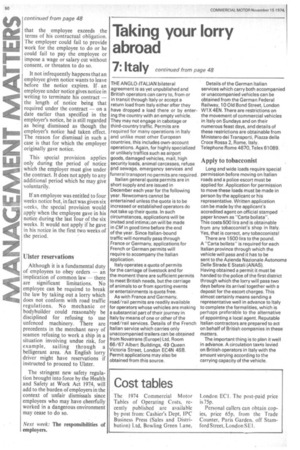The new law on labour relations
Page 51

Page 52

If you've noticed an error in this article please click here to report it so we can fix it.
2: Unfair dismissal
by John Darker AMBIM IN A BACKGROUND. discussion piece, last week, I summarized the main changes in industrial relations law and indicated that some important aspects of the 1971 legislation have been preserved.
The Trade Union and Labour Relations Act 1974 is a much more concise document than the 1971 Industrial Relations Act, but it runs to some 16,000 words and its attached Schedules, which re-enact some provisions of the 1971 Act with or without amendments — are even longer.
It would be tedious to compare the texts of the two Acts in detail, but in broad terms the new legislation is much more favourable in its effects on employees than the 1971 Act. And, as many employers will agree, the Conservative legislation was weighted in many respects in favour of workers' rights. The Industrial Tribunals, for instance, provided an opportunity which many employees were pleased to use to appeal against unfair dismissal, often successfully and with cash benefits.
Managers must learn
What every manager must now do is to learn about labour relations law as it now is, bearing in mind that the Conservatives have said they will not attempt to re-introduce the 1971 legislation. With all its faults the present Act may hold the stage. for a considerable time, though we should remember that some late stage Opposition amendments to the 1974 Bill may be reversed before long, and at least one major piece of legislation on Industrial Democracy is likely to reinforce the provisions of the Trade Union and Labour Relations Act 1974.
In practical terms, most managers are likely to be faced by the unfair dismissal provisions of the new Act, with all that this implies in the maintenance of discipline and the risk of having to pay out compensation to an employee who proves an unfair dismissal.
All employees in all kinds of employment, including Crown employment, have the right to complain if they feel they have been unfairly dismissed, but the complaint must normally be made by the individual employee. An employee is one who has entered into or works under (or, where the employment has ceased, worked under) a contract of employment, ie a contract of service or apprenticeship, whether it is oral or in writing.
For the purpose of the Act, not every worker is an "employee". The unfair provisions do not apply to people working under contracts for services, such as independent contractors, or to members of the police services and armed forces. An employee must have completed the necessary period of employment before he is entitled to complain of an unfair dismissal. For dismissals taking effect between September 16 1974 and March 15 1975 the period is 52 weeks and for dismissals taking effect from March 16 1975 onwards the period is 26 weeks.
This shortened period of service was foreshadowed under the Conservative legislation. The only reason for making the initial qualifying period two years was to enable the Industrial Tribunals to get geared up to the volume of work that would be involved.
There is one important exception to the foregoing. Any dismissal regarded as unfair relating to the employee's trade union membership, or refusal to belong to a nonindependent trade union, or with his objections to belonging to an appropriate union in an undertaking covered by .a union membership agreement, is considered under the Act to be a dismissal for an inadmissible reason. Hence, such employees, regardless of length of service with an employer, and regardless of the size of firm, have the right to complain. Quite evidently, employers and their supervisors who might be tempted to dismiss a "recalcitrant" employee who is an active trade unionfst, in his first months of service, must proceed carefully.
Concise guide
The Department of Employment has issued a concise guide to the Act's Unfair Dismissal provisions and this lists further categories of people who do not rank for the "employee" title. They range from workers in undertakings employing fewer than four people, registered dock workers engaged on dock work, part-time employees who normally work less than 21 hours a week for their employer, employees over the normal age of retirement (65 for men, 60 for women), to close relatives of the employer. Employees covered by a voluntary dismissal appeals procedure which has been exempted from the unfair dismissal provisions of the Act by an Order made by the Secretary of State for Employment, also do not rank for the employee title.
An employee who can prove that his employer's conduct compelled him to resign is now able to complain of unfair dismissal. Under the Act "dismissal" means the termination of an employee's contract of employment either by his employer (with or without notice) or by the employee himself in circumstances in which he is entitled to terminate the contract without notice because of his employer's — presumably unreasonable -conduct.
Justification
Much could be said about the type of conduct by an employer which would justify an employee in walking out without notice. A serious breach of the contract of employment by the employer could be a departure from positive obligations imposed by common law, custom or express contract. The employer could insist continued overleaf that the employee exceeds the terms of his contractual obligation. The employer could fail to provide work for the employee to do or he could fail to pay the employee or impose a wage or salary cut without consent, or threaten to do so.
It not infrequently happens that an employee given notice wants to leave before the notice expires. If an employee under notice gives notice in writing to terminate his contract — the length of notice being that required under the contract — on a date earlier than specified in the employer's notice, he is still regarded as being dismissed as though the employer's notice had taken effect. The reason for dismissal in such a case is that for which the employer originally gave notice.
This special provision applies only during the period of notice which the employer must give under the contract. It does not apply to any additional period which he may give voluntarily.
If an employee was entitled to four weeks notice but, in fact was given six weeks, the special provision would apply when the employee gave in his notice during the last four of the six weeks. It would not apply if he gave in his notice in the first two weeks of the period.
Ulster reservations
Although it is a fundamental duty of employees to obey orders — an implication of common law there are significant limitations. No employee can be required to break the law by taking out a lorry which does not conform with road traffic regulations. No mechanic or bodybuilder could reasonably be disciplined for refusing to use unfenced machinery. There are precedents in the merchant navy of seamen refusing to work a ship in a situation involving undue risk, for example, sailing through a belligerant area. An English lorry driver might have reservations if instructed to proceed to Ulster.
The stringent new safety regulation brought into force by the Health and Safety at Work Act 1974, will add to the burden of employers in the context of unfair dismissals since employees who may have cheerfully worked in a dangerous environment may cease to do so.
Next week: The responsibilities of employers.




































































































